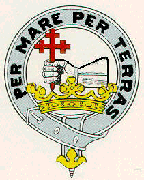Recently, I received an email from a distant cousin, Catherine Beaton, who was born in Mabou, Cape Breton Island, Nova Scotia. She told a couple of wonderful stories about her distant ancestor, Big Finlay "Fionnladh Mor" Beaton. Big Finlay was a grandson of Alexander Beaton of Skye and was the pioneer settler in Mabou. While I am a descendant of Alexander of Skye's second son, John, Finlay was a son of Alexanderof Skye's fourth and youngest son, Alexander. Catherine mentioned that the source for these stories was the late Dan Angus Beaton.
The original that Catherine sent me was an informal e-mail, so I have done a little light editing for continuity. I have preserved her words as much as possible.
Big Finlay Beaton
Music is A Man's A Man For All That sequenced by Barry Taylor
This site created by Harry E. Connors III
Please e-mail me with any additions, corrections, and comments.
The MacDonald Crest


Finlay lived in the Lochaber area, and paid rent to a laird who charged too much, but since the clan system had fallen apart and English lairds and crooked Scottish cheifs owned much of the land, there was nothing to be done. This was the 1780s perhaps. The family decided they had to move to make a better life for themselves. One day the laird came by and asked for the rent, which was late. Said Finlay, "come back next week, and you'll get what's coming to you." Off went the landlord. The next week he came back, riding on his horse, and entered the Beaton croft. "There's your money," said Finlay, "on the table." The laird took the bag and counted the money and found it to be all accounted for. But he then said what everyone knew was coming. "It is still late payment, and this has happened too many times." Going to the hearth, the laird took the pot of water within and doused the fire out. This meant they had been evicted. As the laird was going to leave, Finlay rose and said, "wait one minute, as I promised you last week." The Laird took a step back as Big Finlay advanced on him, saying "now, you'll get what's coming to you." And he knocked the landlord flat out. Going outside, he unhooked the horse and gave it a mighty slap which sent it running. By the time the landlord had woken from his encounter, in all of a rage I am sure, the Beatons were already on a boat taking them to Canada.
Far fetched? Exaggerated probably. I always thought the part about the landlord ceremoniously putting the hearth out was an interesting detail, because it is so obscure.
In any case, There are more stories from Dan Angus to come. As he relates, once in Canada, they settled on Prince Edward Island. But, on PEI they found the same land tenure system that they left Scotland to get away from--a laird system where crofters paid rent. If you look at the map of PEI, the place where they lived, East Point, is at the very tip of the province facing Cape Breton. The body of water in between is relatively small and on a clear day, you can see Cape Breton far off. It's harder for us to see PEI because the land there isn't very high. Nevertheless, from what I have been told, the sight of Cape Breton is what prompted them to up and leave their new home. The thing is, they rowed over. Family and all in their boat, and they landed in Mabou.
Now, I know you must think that is ridiculous, because I do, and you may take it with a grain of salt as you wish. But at the same time there are things that make me believe it. For instance, there's no real reason to make this up when there would be so many around who would dispute it. Also, looking at the map, if one was rowing from East Point, Mabou is not an illogical place to land ashore. Thirdly, there are two geographical features around the base of Mabou Harbour, and they are side by side, facing the strait. One is Beaton's Point, the other is Finlay point. They are said to have landed first at this place. That being said, the story continues that once landed, they slept under the boat, old Grandma included and Finlay said, "this is our land, we're home."
I do not know how many were in the boat or how many boats there were. Whether the old Grandma in the boat was Anne MacBain or Finlay's wife's mother I don't know, but her cane is in the museum in Mabou, hanging on the side of a piano, and is the oldest artifact there.
So, how true are these stories? I believe they contain a great deal of truth. There are some details that might be questionable. For example, I suspect it's an exaggeration to say that Finlay's family was on the boat to Canada before the landlord woke up. Probably, the landlord woke to find no sign of Finlay's family and no sign of his horse. Perhaps, after a long weary walk home, he tried to trace Finlay but, when he found where they had gone, they had already sailed.
Anne MacBain was Finlay's grandmother. I am fairly certain, from entries in Donald Whyte's A Dictionary of Scottish Emigrants to Canada Before Confederation, published by the Ontario Genealogical Society, 1986-2002, that Anne MacBain Beaton did not emigrate to Canada.
This page last modified on Monday, November 26, 2007